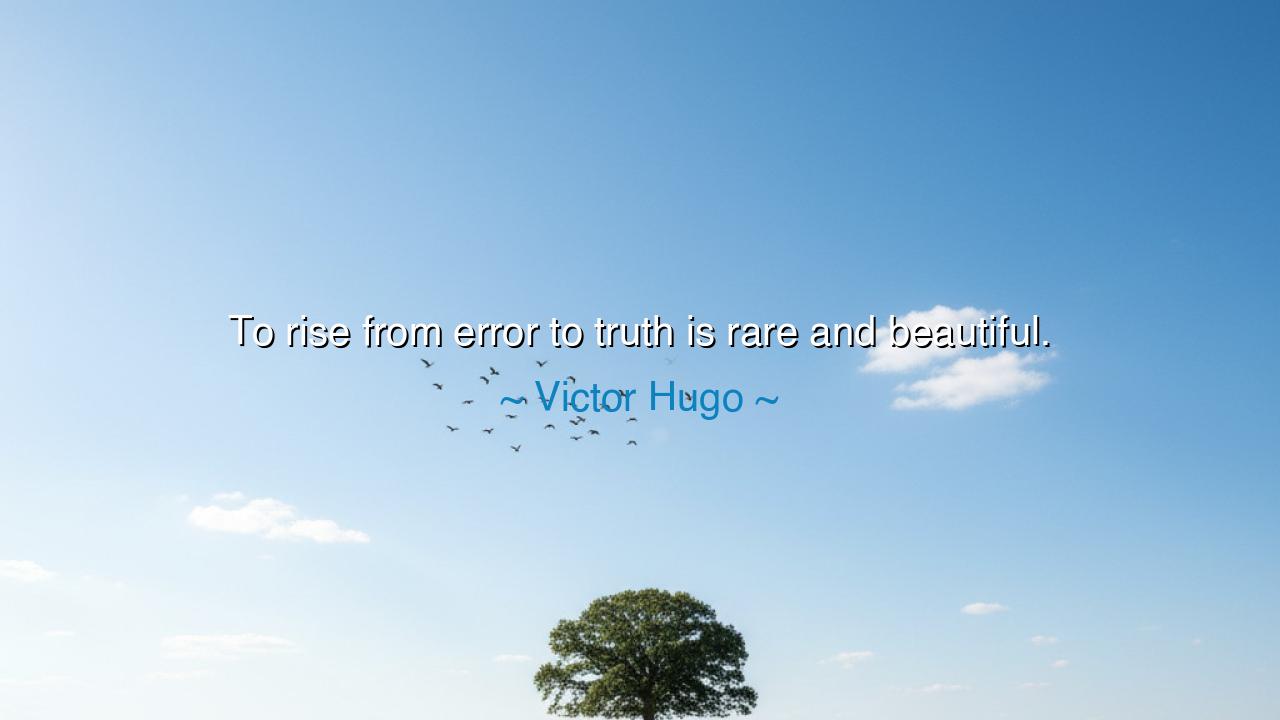
To rise from error to truth is rare and beautiful.






The words of Victor Hugo—“To rise from error to truth is rare and beautiful.”—resound with the solemn music of redemption and transformation. In this declaration, the great poet of France reminds us that to err is the common lot of humanity, but to awaken from error and ascend toward truth is a triumph both uncommon and luminous. Mistakes are easy, falsehoods are many, illusions are alluring. Yet when a soul has the courage to admit its blindness, to wrestle with its ignorance, and to rise upward into the light of truth, such a victory is as beautiful as the dawn after a long night.
The origin of these words lies in Hugo’s lifelong devotion to justice and to the dignity of the human spirit. He lived through revolutions, exile, and the struggle against tyranny. He saw both the errors of men and the nobility that arose when they confessed those errors and sought a higher path. In his writings, from Les Misérables to The Hunchback of Notre-Dame, he portrayed characters trapped in error yet redeemed by the discovery of truth. His words, therefore, are not mere philosophy—they are testimony born of history, imagination, and faith in the human capacity for renewal.
Consider the figure of Jean Valjean in Les Misérables. Once a convict hardened by years of chains, he lived in anger and mistrust. Yet after the mercy of the bishop, who forgave him when justice demanded punishment, Valjean rose from error to truth. He embraced compassion, service, and sacrifice. His life became rare and beautiful precisely because he transformed his past of bitterness into a future of love. Hugo’s quote breathes through this tale: beauty is not in perfection without fault, but in the ascent from brokenness to light.
History, too, offers such examples. Think of Emperor Ashoka of India, who once conquered lands with cruelty and bloodshed. After witnessing the devastation of his own war, he was pierced with remorse and turned to the teachings of compassion and peace. He renounced conquest and embraced the way of the Dharma. Here again we see the truth of Hugo’s words: the rising from error to truth is rare, for few rulers confess their faults; but when it happens, it is more beautiful than crowns and armies, for it redeems both the ruler and the people.
The ancients taught that error, unacknowledged, chains the soul. Socrates declared that the unexamined life is not worth living, for without examination, error remains hidden. To rise from error requires humility, the willingness to confess, “I was wrong.” This humility is difficult, and therefore rare. But when it is achieved, it opens the gate to wisdom, and the one who once stumbled becomes a guide for others. This is why Hugo calls it beautiful—not because error is noble, but because the ascent beyond it reveals the strength of the human spirit.
For us, the lesson is profound. We must not fear our mistakes, but neither must we cling to them with pride. To err is human, but to deny our errors is to remain bound in darkness. The beauty Hugo speaks of lies in the courage to admit failure, to learn, and to change. It lies in the willingness to let truth break the shell of our illusions and reshape us into something better. Such a path is not easy, but it is the path of growth, wisdom, and redemption.
Therefore, take these actions: when you err, confess it quickly and learn from it. Do not let pride blind you to correction. Seek truth not as a possession, but as a horizon to which you continually rise. Encourage others not to despair in their mistakes, but to see them as steps toward greater wisdom. For as Victor Hugo has told us, to rise from error to truth is rare and beautiful, and in that rising lies the nobility of the human soul.






ABan binh
Hugo’s thought that rising from error to truth is rare is an interesting reflection on human nature. I’m curious—why do so many people resist the truth, even when it’s clear they’ve been wrong? Is it fear of being judged, or is it a defense mechanism to protect one’s identity or sense of self? Is embracing truth something that should be more celebrated in society?
LCLe Chau
Hugo’s quote brings up the idea of growth through learning from mistakes. I wonder if the beauty lies in the journey itself, where every misstep is an opportunity to learn something valuable. Does the rarity come from our resistance to change, or is it the courage to embrace truth once we’ve seen it? What do you think makes such a transition from error to truth so rare?
TNViet Thanh Nguyen
I really resonate with Hugo’s perspective, especially the idea that moving from error to truth is not only rare but beautiful. It’s almost like a personal transformation—when you discover you’ve been mistaken and work towards the truth, it feels like an awakening. But what makes it so difficult to let go of errors? Why do we tend to cling to beliefs that aren’t based in truth?
DDTran Danh dumg
Victor Hugo’s statement that rising from error to truth is rare and beautiful makes me think about how difficult it is to accept when we’re wrong. It's so easy to stay attached to our beliefs, even when they might not be entirely accurate. Is it that hard to let go of falsehoods, or is it simply a matter of ego, unwilling to face the discomfort of admitting we were wrong?